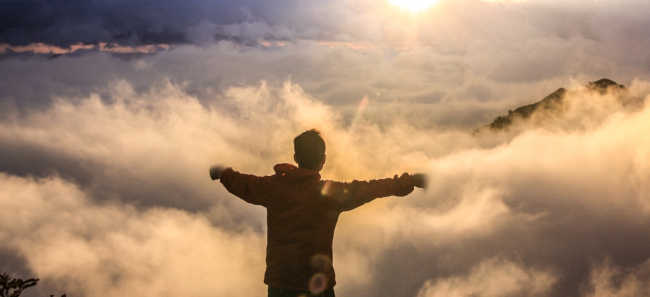
You grew fat—thick and covered with fat. As a result, they abandoned God Who made them, and mocked the Rock of their redemption. (Devarim 32:15)
COMPLACENCY IS SPIRITUALLY dangerous! We were warned about it back in Parashas VaEschanan, and we are reminded of it here once again, in this week’s parsha. We want the good, but we have a difficult time balancing it out with our spiritual responsibilities. As the Talmud says, “Few people eat from two tables.” Materialism and spirituality USUALLY, to a large degree, come at the cost of one another.
It’s simple. Just watch the way someone prays to God when he is financially hurting, and someone else who is financially comfortable. The distraught person pours their heart out to God, but the complacent one tends to use prayer as a way to just “check in” three times a day.
In this world every blessing seems to also come with a curse, and vice-versa. Wealth is great, but it can lead to spiritual corruption. Health is wonderful, but it can make a person forget to thank God for it. Family and friends greatly enhance the quality of a person’s life, but can also take a person away from other important matters, or result in additional burdens.
The Talmud says that Torah comes out of the mouths of the poor. Every form of suffering tends to increase spiritual sensitivity, not necessarily in everyone, but in a lot of people. It is easier to sympathize with others, or empathize with them. It’s very hard to relate to other people’s problems if they have never been yours as well.
For a person who does not believe in God or the Afterlife, it’s no big deal. They don’t care what other people are going through so long as they don’t have to go through it themselves. As far as they are concerned life is random, and it just happened to pick them to succeed. Luck of the draw, and they have no one to thank for their success.
If you believe in God and eternal reward, then SPIRITUAL SENSITIVITY should be the most value commodity in the universe. It’s a reliable mentor. It’s an honorable companion. It’s the truest friend a person can ever know, or need. It not only helps a person to DO the right thing, but it helps them to figure it out when it is not so clear what it is. It’s a beacon by which to steer through the spiritual storm of life, and the sturdy ship on which to survive it.
Since spiritual sensitivity is so crucial to remaining connected to God and acting Godly, it is the mortal enemy of Amalek. This is why Amalek cut off the Bris Milah of the Jews he killed in battle, and then threw it Heavenward. It wasn’t just the Jew he wanted to kill. It was that which he brought to the world and “imposed” upon mankind, CONSCIENCE being the most reviled of all.
This makes the battle for life the battle for spiritual sensitivity. When you hit your chest on Yom Kippur during Viduy, the Confessional Prayer, you were actually saying, “Sorry God for not being spiritually sensitive enough to avoid that sin, and that sin, and that sin, etc. Thanks to Yom Kippur, I AM spiritually sensitive enough to know it was a grave mistake, and I hope to fix that in the upcoming year, b”H.”
This is why Succos comes on the heels of Yom Kippur. So much fun after such a serious day of teshuvah and kaparah? Who doesn’t enjoy going out into the succah for a week and waving the Four Species in shul each day? Who doesn’t look forward to all the dancing on Simchas Torah?
Well, you certainly SHOULD look forward to it . . . if you’re spiritually sensitive, and want to remain that way the rest of the year. Let’s face it, living in the succah for a week and eating out there is a BIG inconvenience. It’s much easier to seat and serve everyone in the house, and I LOVE my bed. Most people do.
It’s interesting that people willingly take on the same inconveniences when they go camping. When asked why they love it so much, they often talk about being reconnected to Nature, etc. But though they may not recognize it as a spiritual experience, or want to call it that, in the end, that is what they are having. They’re connecting to God, on some sublime level, even the Atheist who loves the “Great Outdoors.”
During Succos, I don’t stop loving my dining room table, I just start loving God more. I don’t stop enjoying my own bed. I just start enjoying being out there with God more. It started in Elul, kicked into gear during Rosh Hashanah, and reached a climax during Yom Kippur, and the entire journey has been one of increased sensitivity. It was bolstered by the constant shofar blowing. Succos is the time to ENJOY all that built-up and enhanced spiritual sensitivity.
One of the rearrangements of the word “Amalek” is Ayin-Mem-Lamed, and Kuf. “Kof” is Hebrew for “monkey,” and the two parts translate as, “Work of the Monkey.” Because, for all their “humanness,” monkeys are still animals living as animals do. Amalek says, for all our animalness, let’s live like one, which is easy to do if you are spiritually desensitized.
What a curse! There are a lot of things in life that we enjoy, but which secretly kill us. There is a reason why it takes discipline to eat properly, and to exercise regularly. It’s just so much more fun to eat what you want and be a couch potato. Until that is it brings a person to death’s door.
And that’s what Amalek does, SPIRITUALLY. He feeds you what tastes good, gives you strong drink to wash it down, and helps you make merry. He doesn’t tell you that he is secretly killing you spiritually. You need Yom Kippur for that, or the final Day of Judgment.
“This is the Blessing,” which is the name of the last parsha of the Torah. What is the blessing? Spiritual sensitivity, because with it, you can become personally fulfilled and a partner with God in the perfection of Creation as well as your own.
Have a “Hug” Samayach by embracing spirituality.


